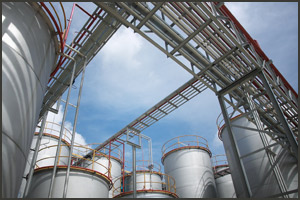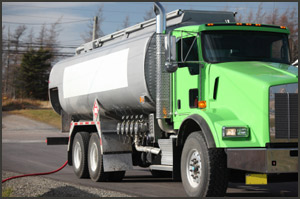Together for a Better Future
ENERGY ASSOCIATION

The production of crude oil involves three separate steps: exploration, drilling and the actual production or bringing of the oil to the surface. These steps may be done by one or more separate companies, which may or may not also be involved in the refining, distribution and/or marketing of refined petroleum products. After water and sediment are removed, the crude oil is transported to a refinery for processing.
Refineries convert crude oil into useable petroleum products. Typically, one barrel of crude oil will yield approximately 19 gallons of gasoline, nine gallons of distillates (home heating fuel, diesel and kerosene), plus lesser amounts of other refined products such as jet fuel, liquid petroleum gas and residual oil. To a limited extent, refiners can adjust the refining process to alter the resulting mix of refined products to fit changing customer needs.
A refinery may be owned and operated by an integrated oil company which drills and produces much of its own oil and directly markets refined products, or by a corporation whose only function is to buy crude oil from producers and sell refined products. Both types of companies may market their products through their own distribution system or to terminal operators and independent downstream marketers (distributors) for further redistribution.
One of the unique advantages of oil as an energy source is the variety of ways it can be transported, both from the well to the refinery, and from the refinery to terminals, bulk plants and eventual end users.
Depending on the distances involved, the location of the facilities and the amount of oil to be transported, crude oil and refined products can be transported by tanker, barge, pipeline, tank truck or railroad tank cars.
The job of transporting crude oil and refined products can be done by the producer, refiner, pipeline trader or one of several downstream distributors, such as a terminal operator or independent marketer. In other instances, the product can be transported from one storage facility to another by a "common carrier" whose only role in the distribution chain is providing the means of transportation.
Water- and land-based terminals generally receive refined petroleum products by pipeline, tanker or barge. In more remote areas of the state, terminals may be served by railroad tank cars or truck transports directly from refineries. The main function of terminals in the distribution chain is to provide temporary storage for refined products for eventual redistribution to smaller bulk plants closer to end users and to directly supply large commercial accounts. A terminal facility will usually store a variety of refined products: gasoline, heating oil, kerosene, diesel, etc. Although often lacking in esthetic beauty, terminals are nonetheless a vital part of the petroleum distribution network. They constitute the chief secondary storage for refined products in a given market area. The storage capacities of terminals vary considerably depending on the market and the terminal's distance from the refineries. Terminals are owned and operated by integrated oil companies, refiners, independent terminal operators, and local distributors.
Smaller than marine or land terminals, bulk plants receive their shipments of refined products by truck transport or rail, either directly from refineries or from terminals. The local marketers who own and operate the plants then redistribute the products in smaller tank trucks to commercial accounts, homeowners, farms and gasoline service stations. Frequently referred to as distributors or wholesalers, the independent marketers who own and operate bulk plants may also own and operate their own service stations and/or home heating oil businesses.
In some instances, a bulk plant owner may resell product to another independent marketer who, in turn, will complete the downstream distribution of the product to service stations and home heating oil businesses. When this is done, the product may not carry the brand name of the original refiner, producer/refiner or terminal operator.
The neighborhood service station may be owned and operated by an integrated oil company, a branded or unbranded refiner, an independent marketer (distributor), chain retailer, convenience store or an independent service station dealer.
The gasoline in the station's pumps may be branded or unbranded and may be supplied directly by a refiner, or by an independent marketer.
 The local home heating oil dealer is responsible for delivering heating oil to homes and commercial buildings throughout the year. In addition to fuel deliveries, a "full service" home heating oil dealer installs and maintains heating and hot water equipment on a 24-hour, 7-day-a-week basis. The dealer may also sell, install and service other energy-related products such as air conditioning systems, solar equipment, energy conservation measures, kerosene, wood and coal.
The local home heating oil dealer is responsible for delivering heating oil to homes and commercial buildings throughout the year. In addition to fuel deliveries, a "full service" home heating oil dealer installs and maintains heating and hot water equipment on a 24-hour, 7-day-a-week basis. The dealer may also sell, install and service other energy-related products such as air conditioning systems, solar equipment, energy conservation measures, kerosene, wood and coal.
Aside from the fuels derived from petroleum, such as gasoline, distillate fuel (including home heating oil and diesel), kerosene-type jet fuel, and residual fuel oil used in industry, marine transportation and for electric power generation, there are many non-fuel uses. These include various specialized products for use in the textile, metallurgical, electrical, and other industries. You may be surprised to learn about some everyday products that are derived from crude oil, including: